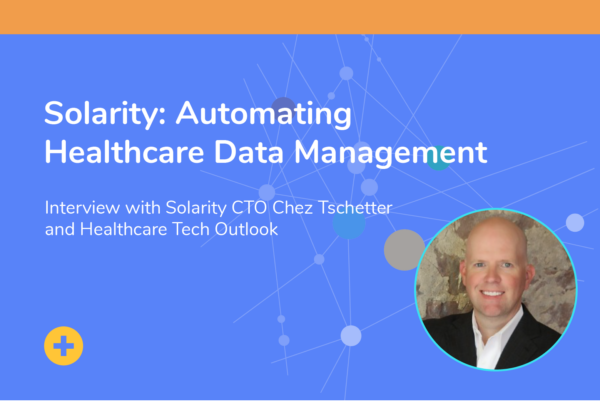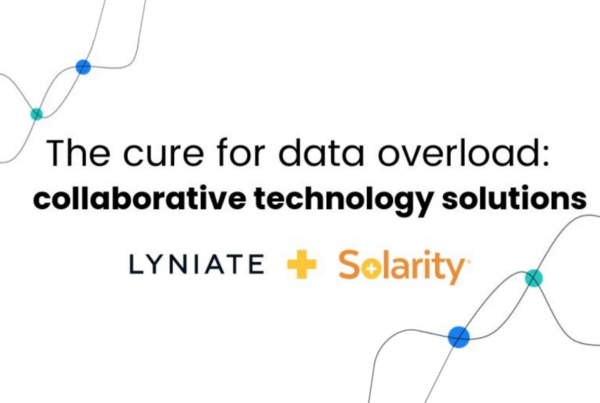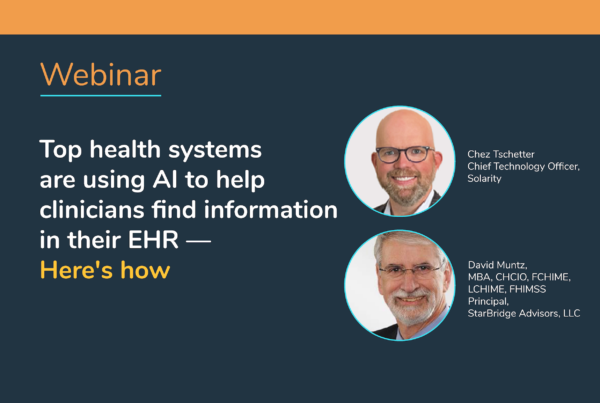Automating the Collection of Health Information
This article originally appeared in Healthcare Tech Outlook Magazine in their listing of the 10 companies that are at the forefront of providing Healthcare Interoperability solutions and impacting the industry. Solarity was honored as one of the 2021 Top Healthcare Interoperability Solution Providers.

Andrew Fehlman, CEO
Before the advent of electronic health records, healthcare data was largely confined to file folders and banker’s boxes. But, with the industry adopting e-health systems as anchored by EHRs, healthcare professionals working in Health Information Management are exploring the new frontier of data analytics. When implementing an e-health application regardless of size, a systemic approach is necessary to account for the technical factors that impact the system’s success.
The biggest technical challenge is creating interfaces between a new system and the existing environment. Lack of plug-and-play interoperability can result in an incomplete picture of the patient’s health and can be detrimental to the patient. Any information deficit can dramatically affect a patient’s safety and often increases the overall cost of care. To get a more complete understanding of the patient’s conditions, healthcare organizations must struggle with this mostly manual interoperability challenge while hoping for a day when easy interoperability is a reality.
Solarity is a hospital and healthcare IT solutions provider that has found a way to help providers tackle the issue of incomplete information. “Solarity acts as a universal conduit for patient information. It helps providers gather and organize patient data across the health system,” mentions Andrew Fehlman, CEO. The company’s solution receives health information from numerous sources in many formats using provider-specific rules to help automate the information collection process. During the process of ingesting data, Solarity stores data according to those rules into the “right” areas in the medical record, usually the EHR.
Although health systems made a significant investment in state-of-the-art electronic health record systems such as Epic and Cerner, there is data that is difficult for these systems to ingest and organize. Too often, patient data arrives in paper form or via fax. Solarity’s technology can capture the patient’s data from paper and faxes using rules to organize it, automating much of the information processing. Solarity also accepts electronic data and can route it to the right area of the record. Some information, whether it started in paper, fax, or electronic form, is routed to a queue where medical professionals can review it before incorporating it into the record. Via these Solarity-enabled processes, healthcare professionals get the patient information organized more quickly. After the initial rules are agreed upon, Solarity can make sure that providers do not need to undertake the extremely labor-intensive task of classifying for each and every patient. For this process, Solarity uses NLP (natural language processing) and OCR (optical character recognition) to convert and organize patient data. By doing so, Solarity reduces the cost significantly of information processes, eliminates the delay caused by manual data classification while improving the quality of data.
“Solarity acts as a universal conduit for patient information”

Developed as proprietary software, Solarity has been serving the healthcare industry for over 15 years. In addition to NLP and OCR, Solarity uses AI (augmented intelligence) coupled with and ML (machine learning). Solarity understands the complexity and inconsistency of healthcare data. For that reason, they pair the solution with a service component. A team of professionals working at Solarity goes the extra mile to work on the exceptions that the software does not initially interpret. “As for our clients, Solarity provides a guarantee that the data they need will be sent accurately and on time,” mentions Fehlman. In one instance, a large healthcare service provider that had implemented an advanced EHR system approached Solarity to address their interoperability issue.
The client leveraged a manual process to classify the patient data, which was highly error-prone and inefficient. After many frustrations, the client decided to implement Solarity to solve their problems. After implementing the solution, the client was able to quickly index information and ensure that their records were updated accurately and timely. Prior to implementing Solarity, the client had multiple records departments with numerous administrative employees. With Solarity, they were able to consolidate those teams into a single department and reduced overall FTE’s, resulting in significant cost savings. Success stories such as this one stem from Solarity’s technological capabilities in solving the intricacies of health information management.
Currently, Solarity has more than a hundred of the top 500 healthcare systems in North America based on net patient revenue. Solarity foresees huge demand for data ingesting from multiple sources in various formats. As the complexity of information management increases, Solarity will be prepared to meet the challenges. The company continues to work on improving data integrity and offers advice and counsel on the increasingly important function of data governance.
Contact Solarity to schedule a demo and learn more about how you can improve your data and information management needs, reduce costs, and improve your provider and patient experience.




